Hunkie Cooper, changing San Diego one man at a time
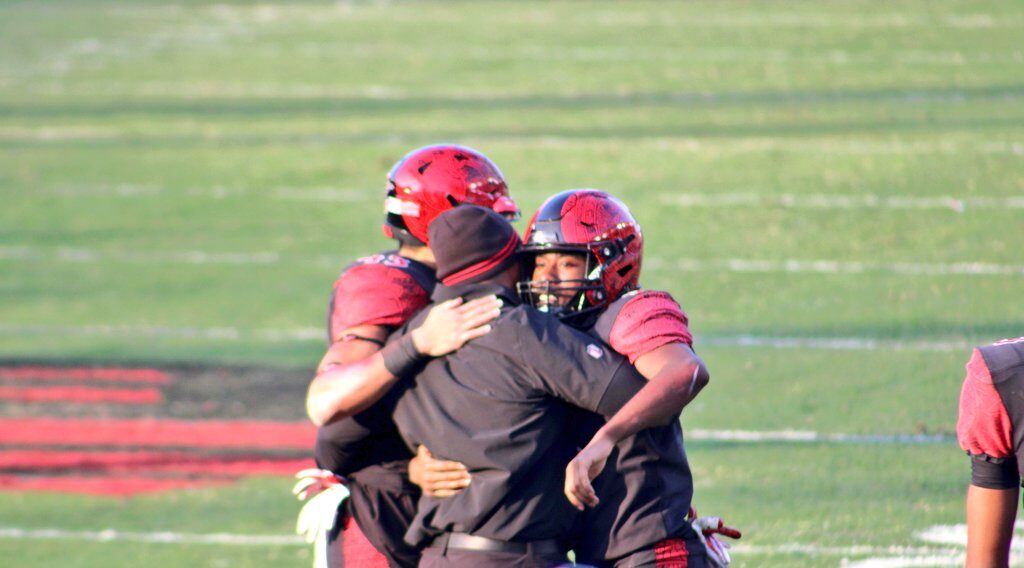
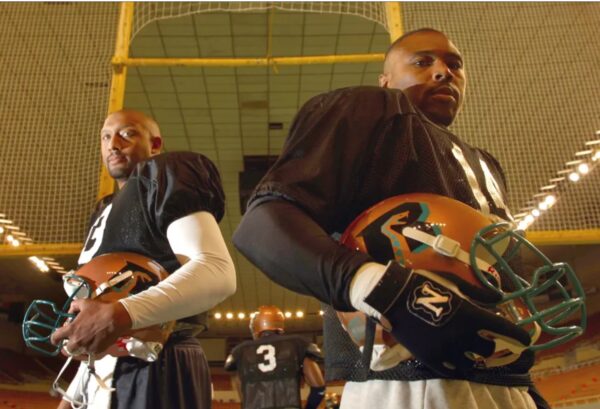
Hernandez James Cooper was born in 1969 in Palestine, TX, the youngest of nine children. His father, a military veteran, made a pact with his best friend that if either died during the Vietnam War, the other would name their next child after them. Hernandez was the fulfillment of that promise.
To Aztec Nation, he is known by a different name, Hunkie Cooper, the wide receivers coach at San Diego State for the past eight years. Cooper’s life is best told through his football accolades, whether on the field as a player or on the sidelines as a coach.
He was the starting quarterback for national champion Navarro College in 1989. He played two years at UNLV, earning All-American and All-Big West honors. His storied Arena Football League (AFL) career playing for the Arizona Rattlers led him to the Hall of Fame. He was named the 5th greatest player in AFL history by the league’s Silver Anniversary Committee. In total, he collected 9000 receiving yards, 196 tackles, and 15 interceptions (seven returned for touchdowns) in the AFL.
Following his playing career, Cooper became a full-time football coach, first serving as the defensive coordinator for the Utah Blaze in the AFL before becoming the head football coach at Canyon Springs High School in Las Vegas. In six seasons, Cooper earned Northeast Sunrise Divisional Coach of the Year three times and led the team deep into the playoffs every year after inheriting a program that had lost 28 of its previous 30 games.
[wpedon id=”49075″ align=”right”]
To the people that truly know Cooper, a kid from East Texas who just wanted an opportunity, these accolades are the least of his value to the world.
“He was a father figure to me,” Donnell Pumphrey told EVT last year. The NCAA All-Time rushing leader played for Cooper at Canyon Springs.
“I really can’t say enough good things about coach Cooper,” Elijah Kothe said during Episode 8 of the SDSU Football Podcast. “Just how he conducts himself as a person. He would care for you beyond football, which is something that’s just really special. He’s really like a father figure to a lot of us in the (wide receiver) room. He’s just legit, and he’s someone I aspire to be like when I become a coach.”
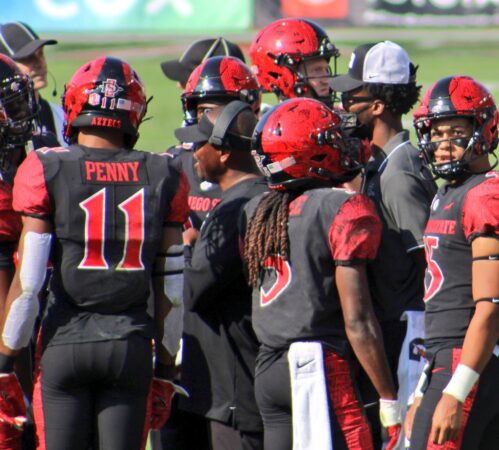
“I never questioned what (Coach Cooper told me) at all because I have 100% confidence in what he tells me about my son,” Julia Boyer, Kobe Smith’s mother, told EVT last year after her son was in a terrifying car accident and Cooper was the first person he contacted afterward.
Sherdrick Bonner, Cooper’s teammate with the Rattlers and fellow AFL Hall of Famer, recalls being continually inspired and in awe of Cooper as they entered the league together in 1993. “Spending 10+ years with someone you trust made my career an easier thing,” Bonner told EVT in an exclusive interview when asked about the bond the two formed.
Bonner calls Cooper one of the most generous men he has ever been around. “He would give haircuts weekly, was literally [making] home-cooked meals for guys all out of his own pocket, and trying to advise them on little things such as professionalism,” he said. “I wish I could have had a video crew following him around because he kept it light and had everyone in stitches regularly.”
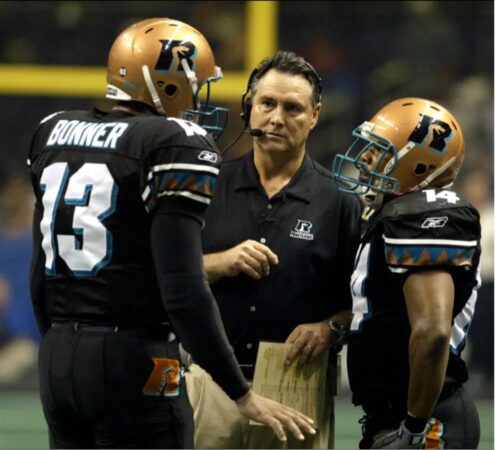
Despite not being the biggest, fastest, or strongest athlete, Cooper was still able to be the best player on the field. “I have never seen a human, then or since, with the will of this man,” said Bonner. “His mindset made him a giant. His attention to detail and desire really separated him. That’s what pushed and motivated him to work so hard to stay ahead of those younger, faster, bigger guys.”
Playing the second half of a playoff game with a torn bicep is one example of Cooper’s will, according to Bonner. But another incident makes a more powerful illustration.
A month before the start of the 1997 AFL season and hours before he was to leave Las Vegas and fly to Arizona for the start of training camp, an accident while cutting his grass with a lawnmower left Cooper wondering if he would ever have the chance to play the game he loves again.
Cooper chronicles the incident in detail in the upcoming Episode 17 of The SDSU Football Podcast. He ended up in the emergency room with a big toe that was “lacerated from the top of [the] shoe all the way down to the bone” and a second toe that “looked like a banana, it was just peeled, and there were grass clippings in it.”
Miraculously, Cooper still flew to Arizona that night and underwent surgery with a skin graft to treat the injury. He was in a hospital bed for nearly ten days. “Adversity builds character,” said Cooper, who had a custom shoe made that would protect his foot when stepped on. Although he was not cleared by his doctors, he was waking up at 4 am and running to get into shape. “I was out, (but) I really wasn’t out,” he said, giving more credence to Bonner’s claim of Cooper’s unparalleled will.
The 1997 season started, and somehow Cooper was on the field competing as a wide receiver, linebacker, and kick returner. His remarkable 1997 journey culminated in the Rattlers winning the AFL Championship against Kurt Warner’s Iowa Barnstormers. Cooper was named MVP of the championship game after catching a touchdown, returning a kick for a touchdown, and an interception for a touchdown. The ultimate trifecta for the football player.
“I [had] a responsibility to play with those guys,” Cooper recalls about why it was so important for him to get back on the field with his teammates. “I was the leader of that team, and just my presence alone made us better because they knew that I was going to give everything I had. Just to get back from that injury, it spoke volumes.”
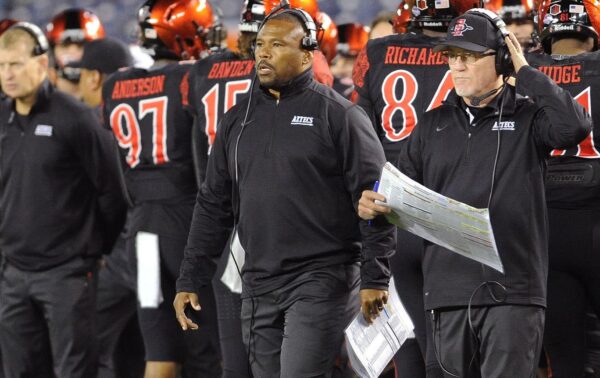
Following his playing career, Cooper brought his fortitude to bear in another area, coaching. Prior to heading to San Diego State, Cooper served as the head coach at Canyon Springs High in Las Vegas for six years. He made sure to follow in the footsteps of his former coaches.
“Everything that I am and have been is because of coaches like coach (SDSU Assistant Head Coach Jeff) Horton and my high school coach,” he said. “Those men came into my life at an early age and were able to influence me. I lost my father at 14 and became a father at 18. Those guys saved my life. That’s why I coach.”
At Canyon Springs, Cooper received a $3,200 stipend check as the head coach but estimates spending $65 to 70k out of his own pocket not just to help his own players, but the entire inner-city community. He cooked hamburgers. He painted the field. He conducted grade checks. He created an off-season workout program for up to 150 kids.
At his school, he made it mandatory to have a 2.0 GPA during the regular term to stay on the football team. Summer school was not an option. In turn, the team achieved a 100% graduation and college placement rate in a school that was 89% Hispanic and African-American, according to the official 2014-2015 accountability report. Suddenly, joining the student council and participating in the speech and debate team became popular.
His determination to teaching youth went beyond academics and athletics. He began imploring the kids to improve their overall daily habits, including wearing shirts and ties and learning table etiquette. “A victory for me on that campus was that I would tell the kids ‘you look nice today,’ and he would say, ‘coach Coop, I tied my own tie,’” Cooper recounts.
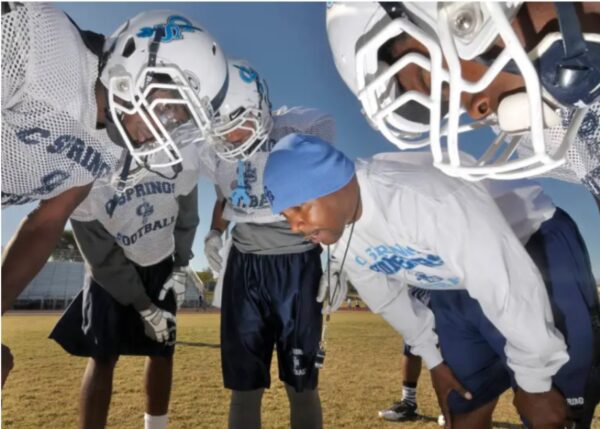
Cooper’s ideals, mentality, and actions served one purpose: saving inner-city neighborhoods one young man at a time. “When you build strong, developed men, those are going to be the men that date your daughters,” he said. “Those are going to be the men that lead the community. Those are going to be the men that generate the workforce, and if they go to college and get married and raise families, that’s how you change the neighborhood.”
His focus, even as a head football coach, was to develop the man first. “If you develop the man, the football player will show up, but if you just develop a football player, that man may never show up,” Cooper stated.
The impact a football coach, and a winning football program, can have on the community showed immediate effects. “When you have a good football program at an inner-city school, crime goes down, and GPAs go up…we change the neighborhood,” Cooper remarked, recalling that the police department substations that used to be set up in the neighborhood near the school suddenly were no longer necessary.
“Everybody knew that we were doing something right, and they gave those kids that opportunity,” he said as he described the relationship he built with the community leaders in the police department and city hall. “If [the kids] did something dumb and had to go to juvenile, [the police] would bring him to me because [the kids] would rather go to juvenile than come to me,” he recalled.
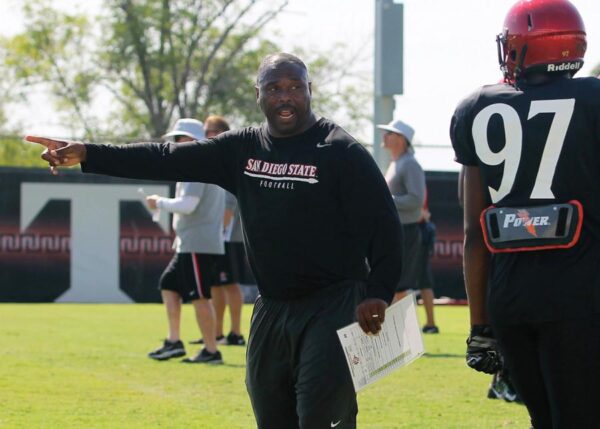
Recently, Canyon Springs High School renamed its football field after its legendary head coach. The Pioneers now play their home football games on Hunkie Cooper Field. Cooper, extremely honored by the recognition and complimentary of the people around him, sees it stemming from more than simply the success his teams enjoyed on the field, “but for changing the lives of young men and changing the community.”
Bonner fully expected Cooper to transition into coaching following his playing days based on how he treated people and his attention to detail. He is not surprised one bit upon hearing that numerous SDSU players consider him a father figure. “I learned a ton of leadership skills from him, and every year I was around him, those traits got stronger in me,” he said. Like Cooper, Bonner also transitioned from player to coach, currently coaching at the high school level and running a quarterback training business in Denver. Bonner is also a television analyst for college football and basketball.
The football world may know Hunkie Cooper as an elite football player and coach, but the people who truly know and have been impacted by Hernandez James Cooper know him as the remarkable man he is, changing the lives of every teammate he played with and every player he coached, one man at a time.
Avid sports fan and historian of basketball, baseball, football and soccer. UC San Diego and San Diego State alumni living in America’s Finest City. Diverse team following across multiple sports leagues, but Aztecs come first in college athletics.